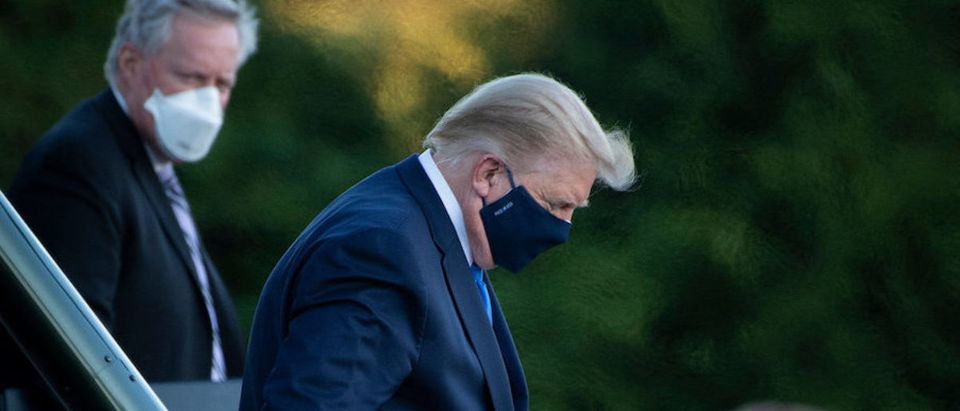Editor’s note: We endeavor to bring you the top voices on current events representing a range of perspectives. Below is a column arguing that President Donald Trump’s coronavirus diagnosis will not help him in the coming election. You can find a counterpoint here, where Republican media strategist Adam Goodman argues that the president’s diagnosis will make him more sympathetic and may help him on Election Day.
Most litigators are trained not to question a witness without first knowing the answer. Most financial advisers and politicians know not to stake their future on predicting that future.
In the finance world, there’s that well-known boilerplate about past performance not being a reliable guide to future performance. Seasoned politicians know better than to predict a future they cannot control. Surprise undermines credibility.
Then there’s President Trump.
When the coronavirus first hit, he told Americans that it would be over by April, that it’s about as dangerous as the seasonal flu, that young people were pretty much immune, that ingesting bleach might cure the disease (although he walked that one back as a joke) and that there could be a vaccine by Election Day.
Trump’s early appearances at the daily coronavirus taskforce briefings did him more harm than good. When he needed to show leadership, he descended into petty squabbling with members of his own team and the press.
The president told The Washington Post’s Bob Woodward that he wanted to downplay the virus so as not to panic the American public. Some Americans may recall the late Senator John McCain’s emphasis on “straight talk.” The president’s happy talk and bluster with the media and others steadily undermined his credibility.
Americans are resilient; we can handle bad news. What we don’t appreciate is dissembling, disinformation and demagoguery.
Meanwhile, the COVID-19 death toll mounted, a second wave of infections began in late summer and now the president himself has been infected, along with several White House staff, senators and others who have been within a handshake of the president.
Let’s get two points out of the way. This once-in-a-century virus and related global public-health crisis are not Trump’s fault. Those Americans who said that Trump’s infection served him right and who also wished him ill should be ashamed.
Ronald Reagan’s near-assassination on March 30, 1981 was not his fault either, but Americans saw a president who was remarkable for his grace, courage, humor and selflessness. We knew he’d been shot, but no one knew then how close that bullet was to his heart.
A president cannot prepare or be scripted for these moments. When Nancy Reagan arrived at the George Washington University Hospital’s emergency center, the president quipped, “Honey, I forgot to duck.” As Reagan’s clothes were cut from his body and he was wheeled into the operating room, he looked at his medical team and asked if they were all Republicans. The chief surgeon, Joseph Giordano (a liberal Democrat), reportedly replied, “Today, Mr. President, we are all Republicans.”
The country was facing a crisis, and Ronald Reagan reassured us with his self-deprecating sense of humor. People still opposed his policies, but many came to admire, if not love, the man. He showed empathy, and in return, he was showered with similar feelings. A few weeks later, the Congress passed his controversial major tax legislation.
President Trump’s COVID-19 infection will, of course, remind the country of his previous boasts, but what will harm him the most on November 3 is his lack of emotional intelligence, the empathy factor.
There are three somewhat odd, but related, incidents that shaped this president’s public image during this time of pandemic. On June 1, he walked from the White House, surrounded by aides, his attorney general and the Chairman of the Joint Chiefs of Staff, across Lafayette Park to stand sternly silent before St. John’s Episcopal Church while raising a Bible in one hand.
While being treated at Walter Reed Medical Hospital, Trump got into an SUV to make a brief outing to waive at supporters who had gathered outside the hospital. Again, he said nothing.
When he returned from Walter Reed Medical Center on October 5, he walked up the steps of the White House, turned to face the Washington Monument, saluted and stood silent as cameras captured his pose.
Revisit those images and ask yourself what the president was trying to suggest. What thousand words do those pictures convey? Empathy and self-deprecating humor are surely not among them.
The president has shown little interest in those around him who have also become infected with COVID-19. His statements about his own recovery are mostly boasts rather than a humble recognition that this highly contagious virus can reach any American, even a president.
This year’s election will turn more on personalities than on policies. A little Reagan-like empathy from Donald Trump might have served him better.
Charles Kolb served as Deputy Assistant to the President for Domestic Policy from 1990-1992 in the George H.W. Bush White House


